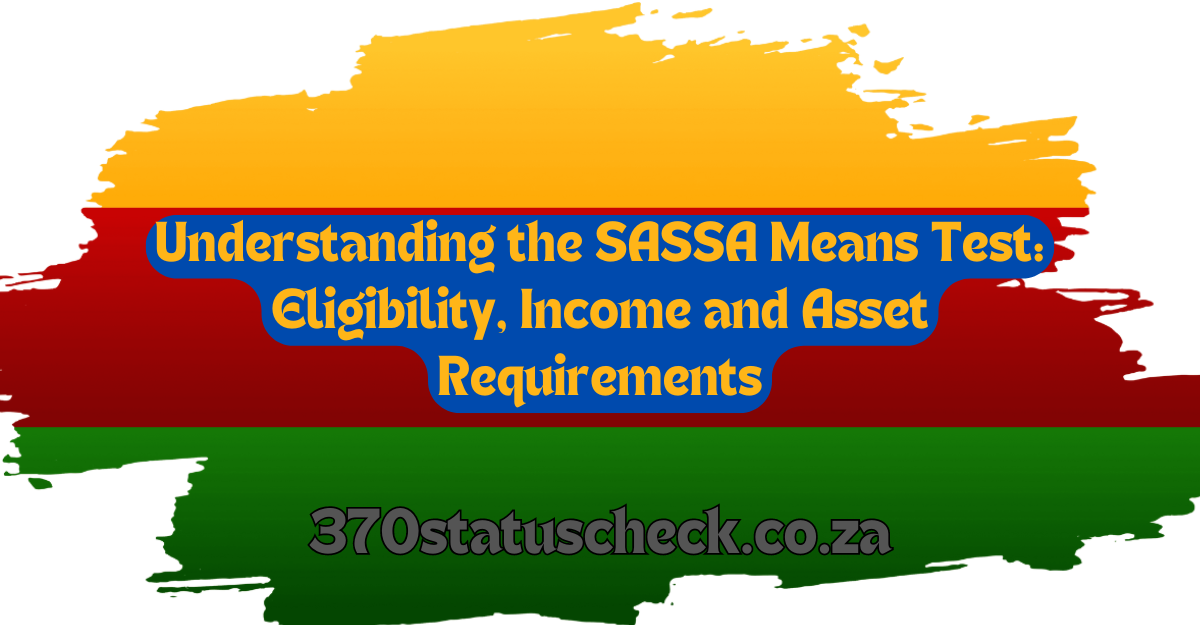Have you ever wondered how South Africa’s government decides who gets financial help? The answer lies in the SASSA Means Test. This test identifies who qualifies for government grants by evaluating their income and assets. In this article, I’ll break down how the test works, what it considers, and how it determines eligibility. If you’re planning to apply for any SASSA grant, this guide will clarify everything you need to know to pass the means test successfully.
What Is the SASSA Means Test?
The SASSA Means Test is a tool used by the South African Social Security Agency (SASSA) to evaluate an individual’s financial situation. It determines if you qualify for grants like the SRD R350 grant, Disability Grant, or Old Age Pension by assessing your monthly income and total assets. The aim is to ensure that government assistance reaches those most in need.
How Does the SASSA Means Test Work?
The test assesses two main factors: income and assets. Here’s how each is evaluated:
1. Income Evaluation
Your income includes all regular money you and your family receive. This could be:
- Salaries or wages from employment
- Pensions or retirement payments
- Income from rental properties
- Investment returns or dividends
- Payments from the Unemployment Insurance Fund (UIF)
- Benefits from the Road Accident Fund or the Compensation for Occupational Injuries and Diseases Fund (COIDA)
Why Does It Matter? If your total income exceeds a specific limit set by SASSA, you might not qualify for assistance. This ensures that the grants go to those who genuinely need financial support.
2. Asset Assessment
Assets are valuable items you own. The test considers various types of assets, such as:
- Property: The value of your home or any land you or your spouse owns.
- Bank Accounts: Money saved in any bank or building society accounts.
- Investments: Funds stored in investment accounts.
- Vehicles: Any car or vehicle registered under your name.
Important Note: If your property has a registered bond (mortgage), its value might be considered zero for the means test, depending on the outstanding debt.
Asset and Income Thresholds: The Key to Passing the Means Test
To pass the SASSA Means Test, your income and assets must fall below specific thresholds set by the agency. These thresholds differ based on the type of grant you’re applying for. Here’s an overview:
Passing the means test is crucial to qualify for any SASSA grant. If you exceed these limits, you won’t be eligible for financial assistance.
Yearly Income Threshold for SASSA Means Test
| Grant Name | Threshold For Single | Threshold For Married |
| SRD R350 | Maximum Monthly Income should be R624 per month | Same |
| Child Support | R61 200 per year | R122 400 per year |
| Care Dependency | R250 800 per year | R501 600 per year |
| Disability | R97 320 per year | R194 640 |
| War Veterans | R97 320 per year | R194 640 per year |
| Older Persons | R97 320 per year | R194 640 per year |
| Grant-in-Aid | R97 320 per year | R194 640 per year |
Asset Limit Threshold for Sassa Grants
The asset limit threshold only applies to Disability grant, Older persons grant, Grant-in-Aid and War Veterans grant.
| Grant Name | Asset Limits for Single | Asset Limits for Married |
| War Veterans | R1 379 400 | R2 758 800 |
| Disability | R1 379 400 | R2 758 800 |
| Older Persons | R1 379 400 | R2 758 800 |
| Grant-in-Aid | R1 379 400 | R2 758 800 |
Types of Grants Evaluated by the SASSA Means Test
SASSA offers several grants, each with unique eligibility criteria. Here are the main grants evaluated through the means test:
- Old Age Pension: For individuals aged 60 or older.
- Disability Grant: For those with a medically verified disability.
- Child Support Grant: Aimed at caregivers of children under 18.
- Foster Child Grant: For caregivers of foster children.
- Care Dependency Grant: For caregivers of children with severe disabilities.
- War Veterans Grant
Note: All these grants require applicants to meet the income and asset thresholds.
Tips to Pass the SASSA Means Test
- Accurate Reporting: Ensure you provide complete and truthful information about your income and assets. Inaccurate details can lead to disqualification.
- Update Regularly: If your financial situation changes, inform SASSA immediately. This ensures your application remains valid.
- Check the Latest Thresholds: SASSA adjusts income and asset thresholds periodically. Stay updated to avoid missing out on eligibility.
What are the Grant Payment Amounts in 2024?
| Grant Type | Previous Amount (April 2024) | New Amount (October 2024) | Increase |
| Old-Age Grant (Ages 60-74) | R2,180 | R2,190 | R10 |
| Old-Age Grant (Ages 75 and above) | R2,200 | R2,210 | R10 |
| Disability Grant | R2,180 | R2,190 | R10 |
| Care Dependency Grant | R2,180 | R2,190 | R10 |
| War Veterans Grant | R2,180 | R2,190 | R10 |
| Child Support Grant | R530 | R530 | No increase |
| Foster Care Grant | R1,180 | R1,180 | No increase |
| Social Relief of Distress (SRD) | R370 | R370 | No increase |
| SASSA Grant-In-Aid | R530 | R530 | No increase |
Why Is the SASSA Means Test Important?
The SASSA Means Test ensures that government resources go to the most vulnerable individuals. It prevents misuse of funds by verifying the financial status of each applicant. This way, grants reach those who genuinely need assistance, such as low-income families, elderly individuals, and people with disabilities.
Common Misconceptions About the SASSA Means Test
- “I own a house; I can’t qualify.” Owning a house doesn’t automatically disqualify you. SASSA considers the bond’s value and other financial factors.
- “If I have a job, I won’t qualify.” Employment doesn’t mean you can’t receive assistance. Your total income, not just your job, determines eligibility.
- “I don’t need to declare everything.” You must declare all sources of income and assets. Failing to do so can lead to application denial.
Frequently Asked Questions
Q1: What happens if I fail the means test?
If you fail, you won’t qualify for the grant. However, you can reapply if your financial situation changes.
Q2: Can I appeal if my application is rejected?
Yes, SASSA allows appeals. Submit a written appeal within 90 days of receiving the rejection notice.
Q3: How often should I update my information?
You should update SASSA whenever your financial circumstances change to avoid complications.
Conclusion
The SASSA Means Test plays a vital role in ensuring financial aid reaches those who need it most. By evaluating your income and assets, it determines eligibility for various grants. Always provide accurate information and stay updated on thresholds to increase your chances of qualifying. Understanding this process is the first step to getting the help you need.

I’m Imani Masuku, and I run 370statuscheck.co.za. My goal is to make it simple for people to check their SASSA SRD R370 grant status online. I’m committed to providing clear, real-time information so everyone stays updated and informed.
Contents
- 1 What Is the SASSA Means Test?
- 2 How Does the SASSA Means Test Work?
- 3 Asset and Income Thresholds: The Key to Passing the Means Test
- 4 Types of Grants Evaluated by the SASSA Means Test
- 5 Tips to Pass the SASSA Means Test
- 6 What are the Grant Payment Amounts in 2024?
- 7 Why Is the SASSA Means Test Important?
- 8 Common Misconceptions About the SASSA Means Test
- 9 Frequently Asked Questions
- 10 Conclusion


1 thought on “Understanding the SASSA Means Test: Eligibility, Income and Asset Requirements (2024)”